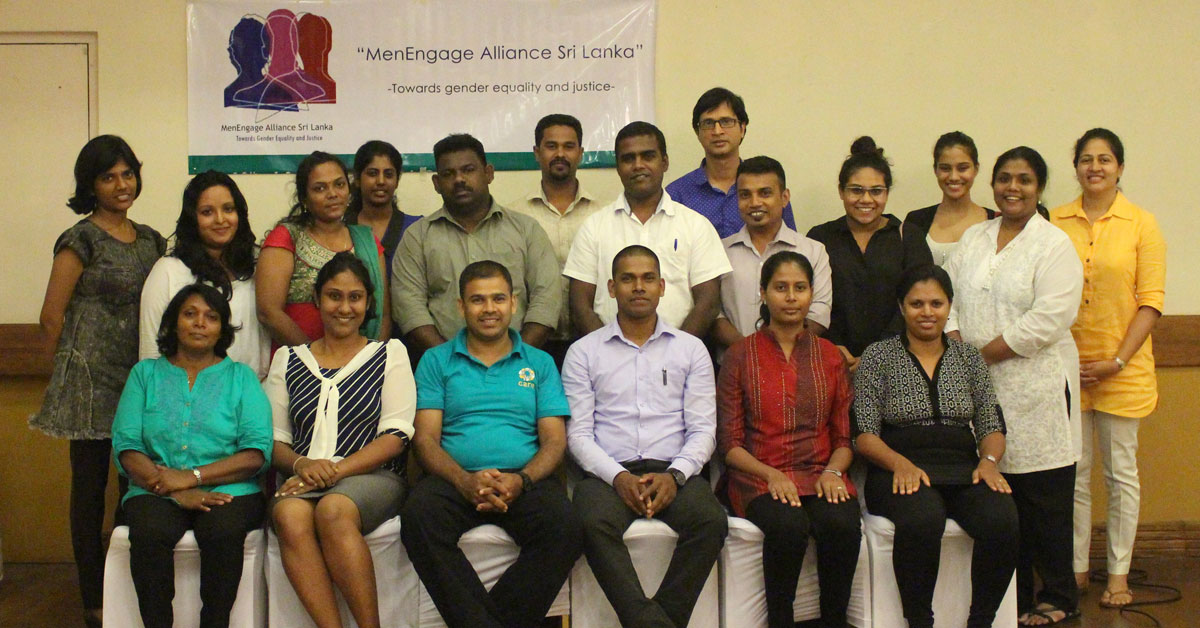
Guest post by Dr. Saikh Imtiaz and Orthi, MenCare Bangladesh
After launching the Priyo Baba (“Dear Father”) campaign last year, MenCare’s partner in Bangladesh, the Center for Men and Masculinities Studies (CMMS), is working to adapt and pilot a new fatherhood program in the country. To learn from others who have already developed and tested programming in South Asia, CMMS staff recently visited MenCare partners in Sri Lanka on an exchange trip.
CMMS’s work on fatherhood began in 2011-2012, when the center developed and tested a project to promote self-reflection and dialogue about masculinities in Bangladesh. The pilot engaged 7,000 men and women through its “Community Dialogue Facilitation Tools” (CDFT).
One of the findings of this pilot project was that fatherhood can be an important entry point for engaging men in promoting nonviolence in the home. Fatherhood can also help facilitate men’s healthier relationships with their spouses and children.
Fatherhood can be an important entry point for engaging men in promoting nonviolence in the home. Fatherhood can also help facilitate men’s healthier relationships with their spouses and children.
Based on these findings, CMMS joined the MenCare campaign with the following objectives:
- Prevent violence against women and children at the household level;
- Promote equitable household decision-making and healthy relationships within couples;
- Reduce family stress and couple conflict, including its impacts on children;
- Increase men’s involvement in household work;
- Foster men’s roles as supportive partners in sexual and reproductive health; and
- Encourage men’s caregiving roles during pregnancy, birth, and the post-natal period.
As part of the MenCare campaign, CMMS will adapt Program P, along with the self-reflective community dialogue program it developed in 2011-2012, and pilot the initiative with 100 couples in 10 communities of Bangladesh. Program P is MenCare’s approach to engaging men in fatherhood, caregiving, and maternal, newborn, and child health.
To learn from others who have already carried out Program P in a South Asian context, two CMMS representatives visited MenCare partners in Sri Lanka in October 2015. Dr. Sayed Saikh Imtiaz (Honorary Executive Director of CMMS) and Afsana Begum (CMMS Program Officer) participated in the exchange with MenCare partner World Vision Lanka, which has extensive experience implementing Program P.
The first two days of the visit were dedicated to meeting with MenEngage Alliance members in Colombo for a knowledge-sharing workshop. Thirty NGO and government representatives took part.
During the workshop, Ashok Kumar, MenCare Coordinator in World Vision’s Nuwara Eliya Area Development Program (ADP), discussed his experiences with implementing fatherhood programming in Sri Lanka’s tea estates.
He explained that the main objectives of fathers’ groups in Sri Lanka are:
- Improve and support healthy, equitable, and nonviolent couple relationships;
- Improve couples’ knowledge and practices related to positive parenting, to promote children’s health and well-being;
- Support an equitable division of caregiving and domestic tasks between fathers and mothers;
- Reduce men’s substance abuse, including alcohol and drug abuse; and
- Equip participants to mobilize their communities to challenge cultural norms and to promote equal treatment of women and men, improving service delivery, education, public administration, and more.
MenCare Bangladesh also presented the various strategies that CMMS is planning to adopt in order to implement Program P. Then, other participants gave recommendations that included the importance of: taking cultural context into consideration; employing a hands-on “learning-by-doing” approach; creating a safe, friendly space for critical reflection and discussion; and working to retain participants until the end of the program.
Other participants gave recommendations that included the importance of: taking cultural context into consideration; employing a hands-on “learning-by-doing” approach; creating a safe, friendly space for critical reflection and discussion; and working to retain participants until the end of the program.
The second part MenCare Bangladesh’s exchange visit took place in Maskeliya, where World Vision’s Ambagamuwa ADP has been carrying out MenCare programming since 2012. During this trip, CMMS staff met with Ambagamuwa ADP Manager Noel Sylvester and his team.
The MenCare Sri Lanka team explained that they hold activity-oriented sessions for groups of 15 to 20 fathers every two weeks, which gives participants time to internalize and put into practice what they have learned. The majority of the groups are held on Sunday in order to maximize participation, as Sunday is tea estate workers’ only day off.
These sessions are run with fathers aged 25 to 40, who have children aged 0 to 14 and who work in the area’s tea estates. Fathers are recruited to the program through word of mouth and by recommendations from their peers. The program has grown from 60 fathers in its inaugural round to hundreds today. Partnering with religious leaders has helped strengthen the program and its reach.
The fatherhood groups are based on the methodology of Program P and address themes such as gender norms, nonviolence, and the division of caregiving, as well as prevention of alcohol abuse (a pervasive problem in the community). While most sessions are conducted with men only, the program culminates with a multi-day retreat for families that includes several sessions for both men and women. At the end of the retreat, fathers formally graduate from the MenCare program, taking an oath to be caring, equitable, and nonviolent husbands and fathers.
At the end of the retreat, fathers formally graduate from the MenCare program, taking an oath to be caring, equitable, and nonviolent husbands and fathers.
Evaluations of the MenCare Sri Lanka program – along fathers’ own accounts – have found that, after participating in the fatherhood groups, a majority of men reduce their alcohol consumption, support their children’s education, and share household activities with their partners. Many fathers say that they now realize being angry and violent harms their children and has long-term, negative effects on the family – and they have vowed to change.
Now, equipped with new knowledge and lessons learned from MenCare Sri Lanka, the Center for Men and Masculinities Studies is confidently moving forward with its own fatherhood program in Bangladesh.